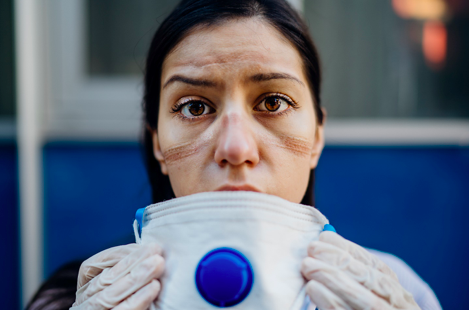Mental disorders accompany humanity in all times and countries. Naturally, during a period of major catastrophic events – pandemics, wars – or immediately after them, the prevalence and manifestations of these conditions increase.
In general, mental health disorders fall into two broadcategories. They used to be called “neuroses” and “psychoses”, and now, respectively, “common” and “severe” mental disorders. NEETs of both types have been clients of the “Hidden Likes” Youth House during and after the pandemic so we have direct observations of them.
In the first category- relatively mild but widespread conditions – under the influence of life events, conflicts and traumas, people can have unreasonable insurance, panic attacks, intrusive and hypochondriacal thoughts, depressed mood, heightened sense of guilt, physical symptoms without physical illness (suffocation, trembling, palpitations, pains and many others), phobias, addictions, eating disorders, etc. No one is protected from such reactions, especially when the cause of them is severe enough. Treatment, through psychoanalysis and/or antidepressants, is necessary when symptoms begin to rule a person’s daily life, and work, friendships, family, and entertainment take a back seat. Whether it will be reached depends also on the resilience of the personality and the capacity to cope with difficulties, which are formed not only on a biological basis, but also with the decisive involvement of the family and personal experience, and can be a comprehensive psychotherapeutic impact
In the other category fall the psychotic disorders – schizophrenia, etc., in which during an illness episode the detachment from reality is significant and the person does not understand and is not responsible for his actions. Psychoses can be very severe, but luckily they are not that common. Only with them, there are hallucinations, delusional thoughts, refusal of treatment, and permanent disability (which in most cases can be avoided). Real-world events such as the Covid 19 pandemic may trigger or influence the content of psychotic episodes, but are not the primary cause of them; biological factors and drug therapy in this case cannot be ignored. But with proper and sufficient treatment (biological, psychological and social), even a person with schizophrenia can work, have family and friends, appear mentally healthy and fit in with others.
In the last few years or perhaps even 1-2 decades ago, the opinion that our mental health is increasingly damaged and deviations from it are becoming more and more widespread and severe has been growing strong among European citizens. Specialists are sceptical of these claims because they know the experience of other countries and of past times. More than 100 years ago, Sigmund Freud noted that we are all at least neurotic. The defence mechanism he describes, “suppression,” explains how we banish from our mind information that frightens, saddens, or embarrasses us. This is the basis of both the escape from reality, which manifests itself through neurosis or psychosis and the general misunderstanding and inadequate attitude towards mental disorders and their treatment. And to the victims, who were never a small percentage of us. And to invest in mental health.
Unfortunately, treatment and rehabilitation of mental disorders in Bulgaria are neither as accessible as necessary, nor are they carried out sufficiently enough. We have medicines that are used all over the world. There are already psychoanalysts in Sofia and some other cities. What`s more, a year ago the journal “Psychoanalysis in Bulgaria: Here and Now” was published. Other psychotherapeutic schools are also being developed, but the Health Insurance Fund does not pay for such a service for now. And as for psychosocial rehabilitation, without which the treatment of psychosis fails, we will only mention that in Sofia there are 2-3 daycare centres with 25 places each and only our Youth House manages to somewhat compensate for the deficit of offered services.
What has Covid-19 brought us?
According to a widespread opinion among specialists, also embedded in the theory, major social crises and difficult times increase the cases of mild mental disorders, while the severe ones remain a relatively constant percentage. The coronavirus pandemic has allowed us to gather our impressions on the matter. We have met many patients who seek help from a psychologist or psychiatrist for the first time. We saw more anxiety disorders with shortness of breath and other symptoms mimicking Covid-19, more hypochondriacal thinking and unnecessary research, more paranoia in the various conspiracy theories, and more domestic violence and addictions brought on by the lockdown. Fanatical adherence to measures and fear especially among those with sick or elderly mothers, and unreasonable denial of danger among those whose businesses are at risk or who are drastically impoverished.
Why has thepandemic reflectedour mental health harder?
When there is a threat, one mobilizes to deal with it and may even feel better. This ensures that tension will only appear when the danger has already passed. In this case, however, we had two threats working in opposite directions – the fear of disease and death, which makes us lock ourselves at home, and the fear of impoverishment and hunger, which forces us to go to work and expose ourselves to the risk of contamination. And if we remember the “Double bind” hypothesis as a cause of schizophrenia of Gregory Bateson and Jay Haley of the Palo Alto Institute, USA, according to which the disease originates from receiving (in early childhood) strong conflicting messages from a source that cannot be neglected, we can speculate why both neurotic and psychotic disorders have worsened as a result of the Covid crisis.
But finally, the importance of mental health reached more people – thanks to the project LIKE anti-stigma campaign, regular open days, podcasts “Questions and answers”, meetings with citizens and employers – all this has supported our work and assisted the processes of acceptance among the society of mental health problems.
Elka Bozhkova, a psychologist at the LIKE project


